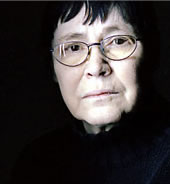Tijana Miletic
European Literary Immigration
into the French Language
Readings of Gary, Kristof, Kundera and Semprun
Agota Kristof
(1935 - 2011)
 Agota Kristof was born on 30th October 1935 in Csikvand, Hungary. When the Russian army invaded Hungary in November 1956, Kristof left the country with her husband, who used to be her history teacher, and her four-months-old daughter. They travelled to Vienna, with the intention of emigrating to the United States, but the fear and uncertainty of this long voyage convinced them to settle in French-speaking Switzerland (Suisse Romande). She worked in a watch-making factory where she slowly learnt the language of her adopted country. She wrote her first play in French, Le Rat qui passe, in 1972 and completed her first novel Le Grand Cahier at the age of 51. Published in 1986, Le Grand Cahier achieved great success, was translated into many languages and awarded the title Livre Européen. She was awarded the prestigious Swiss literary prize Prix Gottfried Keller in 2001. She lived in Neuchâtel until her death on 27th July 2011.
Agota Kristof was born on 30th October 1935 in Csikvand, Hungary. When the Russian army invaded Hungary in November 1956, Kristof left the country with her husband, who used to be her history teacher, and her four-months-old daughter. They travelled to Vienna, with the intention of emigrating to the United States, but the fear and uncertainty of this long voyage convinced them to settle in French-speaking Switzerland (Suisse Romande). She worked in a watch-making factory where she slowly learnt the language of her adopted country. She wrote her first play in French, Le Rat qui passe, in 1972 and completed her first novel Le Grand Cahier at the age of 51. Published in 1986, Le Grand Cahier achieved great success, was translated into many languages and awarded the title Livre Européen. She was awarded the prestigious Swiss literary prize Prix Gottfried Keller in 2001. She lived in Neuchâtel until her death on 27th July 2011.
shown above: View of Neuchâtel, Switzerland.
Recommended reading
In French
- Le Grand Cahier (Paris: Editions du Seuil, 1986)
- La Preuve (Paris: Editions du Seuil, 1988)
- Le Troisième Mensonge (Paris: Editions du Seuil, 1991)
- C'est égal (Paris: Editions du Seuil, 2005)
In English
- The Notebook, translated by Alan Sheridan, The Proof, translated by David Watson, The Third Lie, translated by Marc Romano
(New York: Grove Press, 1997)
Recommended viewing
- Brucio nel vento (2002), film based on the novel Hier (Yesterday)
directed by Silvio Sodini - Le Continent K. (1998) and Agota Kristof, 9 ans plus tard ... (2006), two short documentaries about Agota Kristof directed by Eric Bergkraut, available on DVD in French or German version from p.s. 72 productions
- Écrire, après tout (2010), a documentary about Agota Kristof directed by Sabine Bally at TWOSA
- Le Grand Cahier (2013), film based on the novel Le Grand Cahier (The Notebook) directed by János Szász
Selected links
In French
- Wikipédia sur Agota Kristof
- Dossier Culturactif
- Dossier Viceversa
- Le Matricule des Anges: interview
- Agota Kristof censurée
- Cruelle Agota
- "Agota Kristof du commencement à la fin de l'écriture" par Erica Durante
- "Le Fonds Agota Kristof" par Marie-Thérèse Lathion
- L'Analphabète d'Agota Kristof
- La presse suisse rend hommage à Agota Kristof
- Agota Kristof: «Après on sera mort tout le temps. On peut tout de même attendre jusque là!» par Aliette Armel
- «Je m'en fous», disait Agota Kristof
- Mort d'Agota Kristof, romancière apatride
In English
- Wikipedia on Agota Kristof